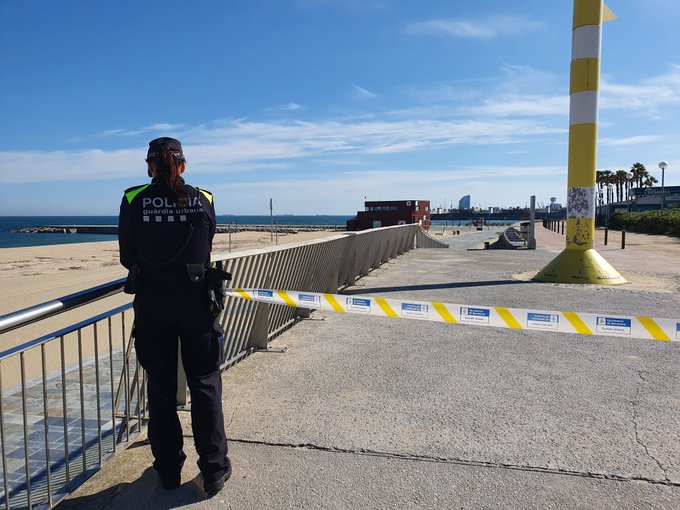Click here for today’s full report: Coronavirus in Spain (5 May)
ALSO READ: Lifting of lockdown in Spain – full details of all phases
Please support Spain in English with a donation.
LATEST – Spanish Prime Minister Pedro Sánchez has announced in a televised address on Saturday evening that people in Spain will be able to leave home for individual physical exercise and walks from next Saturday 2 May, if the ‘evolution of the [Coronavirus] pandemic is favourable’.
Report below updated in Spain at 13.35h on Saturday 25 April.
The latest official figures* released by Spain’s Health Ministry in Madrid at 12.30h on Saturday 25 April confirm that 22,902 people have now died from the pandemic in Spain, up by 378 on yesterday.
Friday had seen an increase of 367 Coronavirus-related deaths over Thursday – the lowest daily increase since 21 March. Thursday had seen an increase of 440 over Wednesday. Wednesday had been 435.
The current peak of recorded deaths related to Coronavirus in a 24-hour period in Spain was on 2 April, when 950 deaths were registered.
The Health Ministry has recently changed its criteria for the way the data of those infected with Coronavirus is presented. Figures released on Saturday 25 April now show a total of 223,759 known cases of Coronavirus (Covid-19) in Spain – which is 3,995 more than the figure released yesterday.
However, the ministry is now also giving the figure of those who have only tested positive through a PCR (polymerase chain reaction) test. That figure today is 205,905 (out of the total 223,759) – an increase of 2,915 over yesterday’s figure.
The current peak of recorded infections for a 24-hour period in Spain was on 31 March, when 9,222 new cases were registered.
95,708 people have now made a full recovery, an increase of 3,353.

With regards the official figures released by the central Health Ministry for each region of Spain, it is important to note that there have been discrepancies in the data released independently by some of those regions, particularly for Madrid and Catalonia. Please refer to *Health Ministry data and regional discrepancies below.
Of the official figures released by the ministry today – and based only on the total 205,905 confirmed cases through PCR testing – there are now 58,819 cases in the Madrid region and where 7,848 have died (from the total 22,902 across the country). There are now 46,261 cases in Catalonia and where 4,498 have died.
There are now 12,366 known cases in the Basque Country (1,212 deaths), 11,703 in Andalusia (1,131), 15,509 in Castilla La Mancha (2,292) and 10,066 in the Valencia region (1,172).
Figures for those infected with Coronavirus in other regions* are now as follows: Aragón 4,922 (709 deaths), Asturias 2,238 (239 deaths), Balearic Islands 1,847 (174), Canary Islands 2,155 (130), Cantabria 2,071 (182), Castilla y León 15,990 (1,639), Ceuta 100 (4), Extremadura 2,718 (416), Galicia 9,116 (388), Melilla 108 (2), Murcia 1,468 (126), Navarra 4,627 (429) and La Rioja 3,821 (311).
A full breakdown in Spanish of the data per region, together with age group statistics can be found by clicking here. Please also see ‘Health Ministry data and discrepancies’ below.
Sign up for the FREE Weekly Newsletter from Spain in English
Please click to support Spain in English with a contribution
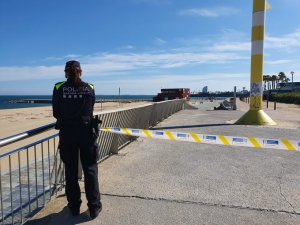
GLOBAL OVERVIEW
After US President Donald Trump said on Thursday that researchers should try to apply their findings to Coronavirus patients by inserting disinfectant into their bodies, he has since claimed he had been speaking ‘sarcastically’.
Gyms, hairdressers and tattoo parlours reopened on Friday in the state of Georgia as the USA surpassed 50,000 deaths from the Coronavirus pandemic. Georgia’s statistics for Covid-19 are much lower than those in New York, the US epicentre, but are still high. Georgia has more than 22,400 confirmed cases with 899 deaths.
Global leaders pledged on Friday to accelerate work on tests, drugs and vaccines against Covid-19 and to share them around the world, but the USA did not take part in the launch of the World Health Organization (WHO) initiative.
French President Emmanuel Macron, German Chancellor Angela Merkel and South African President Cyril Ramaphosa joined the video conference to launch what WHO called a ‘landmark collaboration’ to fight the pandemic.
‘We are facing a common threat which we can only defeat with a common approach,’ WHO Director General Tedros Adhanom Ghebreyesus said.
EU Commission President Ursula von der Leyen said that the objective at a global pledging effort on 4 May would be to raise 7.5bn euros for work on prevention, diagnostics and treatment. ‘This is a first step only, but more will be needed in the future,’ von der Leyen told the conference.
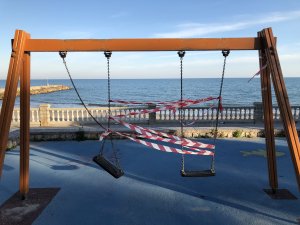
CORONAVIRUS in SPAIN
Children allowed out tomorrow
Up to three children under the age of 14 accompanied by an adult are to be allowed out for an hour a day (and once a day) from tomorrow, Sunday 26 April.
The relaxing of the confinement restrictions for children are part of the new measures of the country’s extension of the ‘state of alarm’ lockdown until 9 May.
Children should not leave home if they have shown or are currently showing any symptoms of Coronavirus, nor if they have been in contact with anyone with symptoms or who has been diagnosed as being infected with Covid-19, if that person has not since completed 14 days of quarantine.
Children under 14 will not be allowed outside alone. Any daily walks with adults should not be further than one kilometre away from the home. Children will be able to exercise and run, however, as long as they continue to respect social distancing. A minimum of 2m should be maintained from other people. It is not compulsory for children to wear face masks, but it is recommended.
The daily walk will only be allowed between 9am to 9pm – and that ‘peak hours’ should be avoided. The adult accompanying the children must be someone who lives with them – either a parent or guardian, or an elder brother or sister who is over the age of 18.
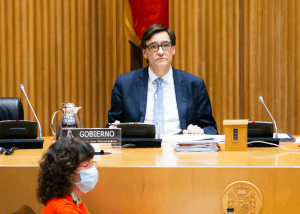
The walks and exercise can be taken in public open ‘green spaces’ and squares, as well as community gardens – but access to walk on the beaches is still prohibited in most regions of Spain (see below).
The decision to use the community gardens must be taken by the residential or property’s administrator.
Sports facilities as well as children’s playgrounds and play areas will remain closed. Children are allowed to play with balls or use skateboards and scooters, but only if they respect the 2m social distancing with others.
Spanish Health Minister Salvador Illa said that 6m children across Spain will benefit from the new rules. A ministerial order has been issued today, Saturday, for the measure to come into effect tomorrow.
‘These supervised outings will have numerous beneficial effects on our children, both physical and emotional, especially in those who live in the most vulnerable households,’ said Illa. ‘Not all homes have the same conditions and not all lifestyles are the same. As a result, this is also an equality measure.’
Illa also stressed that whilst these ‘relief measures have been introduced, [the overall lockdown] confinement measures remain fully in place.’
Beach restrictions differ in regions
With the restrictions being lifted for children, there are also different rules being implemented in the different regions of Spain with regards access to the beaches. The local police in Barcelona (the Guàrdia Urbana) have reminded citizens that the Catalan capital’s beaches are still closed, and that the use of children’s play areas alongside them are also not permitted. They have also stated that the city’s 148 parks and gardens remain closed.
Recordeu que els 148 parcs i jardins de Barcelona estan tancats ?.
❌ No està permès l'ús de les àrees de joc infantil.
❌ No es pot accedir a les platges de la ciutat que resten totes amb bandera vermella com a mesura preventiva. #Covid19. pic.twitter.com/t23aTIsIth— Guàrdia Urbana Barcelona (@barcelona_GUB) April 25, 2020
Meanwhile the City Council of Marbella in Andalucia, has said that children accompanied by their parents, who live one kilometre or less from the beaches, are able to walk along them, ‘although bathing is still prohibited’.
Ángeles Muñoz, Mayor of Marbella, tweeted that ‘we still have a red flag on all the beaches on the coast. Each adult may be accompanied by up to a maximum of three children to walk, without bathing and with a maximum of 1 km away from home.’
? Recordar que aún tenemos bandera roja en todas las playas del litoral. Cada adulto podrá ir acompañado de hasta un máximo de tres hijos para pasear, sin bañarse y con un máximo de 1 km de distancia del domicilio. #Marbella pic.twitter.com/4roRINPqjD
— Ángeles Muñoz (@AngelesMunoz_) April 25, 2020
This report is currently being updated.
Sign up for the FREE Weekly Newsletter from Spain in English
*Health Ministry data and regional discrepancies
The Spanish Health Ministry has not been giving complete figures for the number of people in intensive care units (ICUs) for over 10 days, because some of Spain’s 17 regions had been using different methods to collate these figures. There had also been discrepancies in how some of the regions had been collating the statistics for the number of deaths from Coronavirus.
In Catalonia, for example, the regional health department had only previously been counting figures for those who had died in hospitals. This was then changed to include data provided by funeral homes, which includes those who have died not only in hospitals but also in nursing homes, social health centres or elderly residences, as well as at home.
Last Friday, following discrepancies in the way that data has been collated, the Spanish government published an order in its Boletín Oficial del Estado (BOE)to clarify the criteria that must be used.
All regions must now report deaths and ICU admissions in the same way. A victim can only be counted in the death tally if they have tested positive for Covid-19 via a PCR (polymerase chain reaction testing) or rapid test. The same applies to confirmed infections.
The Health Ministry has also requested that each region send in the total number of infections divided into symptomatic and asymptomatic cases. In addition, they also require the number of PCR tests carried out from each region, the total number of people that have required hospital treatment, including intensive care, as well as the number of patients who have been discharged.
Salvador Illa, the Spanish Health Minister, has said that, ‘Spain is following a very strict definition of cases in line with international authorities, including the World Health Organization (WHO) and the European Centre for Disease Prevention and Control (ECDC). Anyone who tests positive for Covid-19 and then dies is considered a Coronavirus fatality’.
Sign up for the FREE Weekly Newsletter from Spain in English
Please click to support Spain in English with a contribution
Below are the numbers to call for each region of Spain for information and assistance in the event of possible cases of Coronavirus – as issued by the Spanish health authorities.
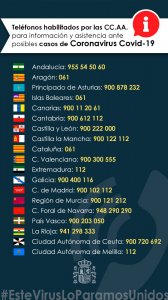
Up-to-date WHO advice and facts (in English) about the Coronavirus epidemic can be found here: www.who.int/emergencies/diseases/novel-coronavirus-2019/technical-guidance.
Our previous reports on Coronavirus in Spain:
ALSO READ: Opinion: why bullfights should stay cancelled after Covid-19
ALSO READ: Coronavirus in Spain full update (24 April)
ALSO READ: Coronavirus in Spain full update (23 April)
ALSO READ: Spain votes to extend lockdown to 9 May. Children to be allowed out
ALSO READ: Coronavirus in Spain full update (22 April)
ALSO READ: Spanish government: children can go with adults to supermarkets, but not parks
ALSO READ: Coronavirus in Spain full update (21 April)
ALSO READ: Pedro Sánchez seeks cross-party ‘Moncloa Pact’ for recovery programme
ALSO READ: Coronavirus in Spain full update (20 April)
ALSO READ: Coronavirus in Spain full update (19 April)
ALSO READ: Co-Vida: an inspiring community action project
ALSO READ: One day more, one day less
ALSO READ: ‘Up on the Roof’ – surviving lockdown from above
ALSO READ: Open Arms refugee NGO helping to combat Coronavirus
ALSO READ: When can La Liga restart?
ALSO READ: Lockdown in Spain set to be extended until 26 April
ALSO READ: Coronavirus in Spain: unemployment figures worst on record
ALSO READ: FC Barcelona players agree to 70% pay cut, and will ensure staff receive 100%
ALSO READ: Animal rights NGO starts petition against possible state aid for cancelled bullfights
ALSO READ: Spain publishes list of hotels that will remain open
ALSO READ: Video of boy training as goalkeeper in isolation goes viral
ALSO READ: The new restrictions at Spain’s airports, ports and land borders
ALSO READ: Madrid starts receiving patients at IFEMA exhibition centre ‘hospital’
ALSO READ: Walking a goat or a Vietnamese pig is not allowed
ALSO READ: Coronavirus in Spain – full advice for British travellers seeking to return to the UK
ALSO READ: ‘This virus we will stop together’ – video
ALSO READ: Despite lockdown, Spaniards applaud health workers from balconies every evening
Editor’s note:
At Spain in English we’re always keen to also publish positive stories and features about life in Spain – not just the current news. With all cultural and sporting events currently on hold, as well as travel and gastronomic excursions, we welcome on-going contributions from all of you who’d like to send us articles for publication. Although we are unable to currently pay for contributions, we will certainly credit you and share the articles across our social media network (if of interest) – and/or also link to your own blogs or other sites. We currently welcome upbeat, positive and fun articles – perhaps how you’re coping with the ‘lockdown’ in your own area of Spain – or how your community is responding, or recommendations of help to others. We have a dedicated ‘Opinion, Blogs & Spanish Experiences‘ section where your articles will appear. We will edit for clarity and length only – and we reserve the right to not publish. Articles should be sent via email to editorial@spainenglish.com (preferably with a photo and credit details), and should be around 500 words (800 to 1,000 max). We will try to respond to everyone, but please be patient with us. We’re a very small team but with big ambitions! Please stay safe. Thank you for reading and following us.
Sign up for the FREE Weekly Newsletter from Spain in English
Please click to support Spain in English with a contribution

